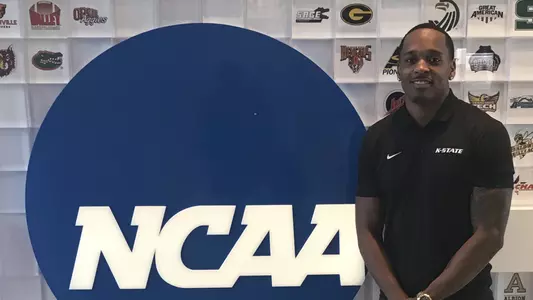Kansas State University Athletics

SE: Barry Brown Ready to Build Better Brand, Stronger Relationships After NCAA Elite Student-Athlete Symposium
Sep 13, 2018 | Men's Basketball, Sports Extra
By Corbin McGuire
Barry Brown's relationship with social media took on a different meaning this past weekend, which he spent in Indianapolis, Indiana, for the three-day NCAA Elite Men's Basketball Student-Athlete Symposium.
For Brown, Twitter and Instagram, among other platforms, are no longer purposeless places to kill time on. They are a way to build his brand in a positive manner. This was one of Brown's biggest takeaways from the symposium, which is designed for men's basketball student-athletes who have an interest in continuing their playing careers professionally.
"I learned to not be doing that negative stuff on social media, watch what I'm liking, watch who I'm following, watch what I'm retweeting, stuff like that," K-State's senior guard said, "just because people look at that stuff and paint their own perception, their own picture of you. Even though you might be a good person, you retweeting or liking something on Instagram might allow people to paint an image of you that's not who you are."
Carrie Cecil, CEO of Social Media Sports Management and Anachel Communications, Inc., was one of the symposium's many speakers. During her speech, she pulled up each one of the 14 invited players' social media profiles. She dissected them one by one, giving specific examples of how to better use their social platforms.
This sank in with Brown immediately.
"Carrie Cecil said that videos get more views and likes than photos and other stuff like that," Brown said. "I just wanted to start with that."
"So when we got back, the very first thing he said was, 'Let's make a video,'" added K-State men's basketball Director of Video Services Mike Furlong, who traveled with Brown to the symposium. "It was fun to make. We kind of did it together. He was, like, 'I want that one in there, that in here.' He was really energetic about it."
Brown posted the highlight video, 2 minutes and 20 seconds long, on Twitter on Monday evening. By Wednesday morning, it had already received more than 200 retweets, 1,100 likes and 31,000 views.
"I got some good feedback," he said. "That's just the first step I've taken toward building my brand."
The symposium, which Brown's teammate Dean Wade attended last year, included a multitude of other topics and speakers. These included Clarence Nesbitt, general counsel for the NBA Players Association, financial management specialist David Byrne, Sports Science Institute's associate director Dawn Buth, former NBA players Brandon Johnson, Eddie Gill, Cherokee Parks and keynote speaker Jahidi White, along with many NCAA administrators.
"It was just a lot of information thrown at me in a short amount of time, but I feel like it was definitely beneficial," Brown said. "It was very beneficial for preparing my mind for life after college."
"The best part for him was hearing the basketball guys talk about their own experience and where they made mistakes and where they made good choices," Furlong added. "That was when he was super locked in and interested. After they finished talking, he'd go up to them and talk to them more one-on-one."
Brown, who tested the NBA Draft process this summer, said he heard over and over again at the symposium the importance of continuing to prove yourself as a player and as a person. Both, he learned, can be crucial for your future.
Financially, he said this applies in both the short and long term. For those who make it to the NBA, he said the symposium reinforced the fact that the first contract is not where the "real money" is going to come from.
"You have to keep playing, keep proving yourself every day. Every year they're drafting 60 people in the NBA and also there are undrafted guys who are trying to take your spot. You have to keep proving yourself to try to get that second contract, which is where the real money's going to come in," he said. "So, they talked about not blowing your money, not gambling, spending it on the highest marked car in the lot."
Off the court, Brown said speakers like Parks, Gill and Johnson echoed the value in building connections and relationships wherever they went. In their experience, it paid off in the form of jobs after their playing careers were finished.
"Brandon Johnson talked about someone five, six, seven years ago that he said he made such a great first impression on, and that he needed him later down the line recently and his first impression way back then helped him to get a job now," Brown said. "It's (about) building relationships, talking to people, not always going to places with your headphones in or looking down at your phone and interacting with the people around you."
Furlong said those three speakers used the term "occupational transition" instead of retirement. It more accurately represents what they faced when their playing careers were finished.
"You still have to work. And all of them went through the relationships they made as players and treated people right. So those are the biggest things they tried to tell them because if you're successful, you do well and treat people right along the way, then they'll come back and help you out," Furlong said. "Barry already treated people right but now I feel like he'll go the extra step."
Barry Brown's relationship with social media took on a different meaning this past weekend, which he spent in Indianapolis, Indiana, for the three-day NCAA Elite Men's Basketball Student-Athlete Symposium.
For Brown, Twitter and Instagram, among other platforms, are no longer purposeless places to kill time on. They are a way to build his brand in a positive manner. This was one of Brown's biggest takeaways from the symposium, which is designed for men's basketball student-athletes who have an interest in continuing their playing careers professionally.
"I learned to not be doing that negative stuff on social media, watch what I'm liking, watch who I'm following, watch what I'm retweeting, stuff like that," K-State's senior guard said, "just because people look at that stuff and paint their own perception, their own picture of you. Even though you might be a good person, you retweeting or liking something on Instagram might allow people to paint an image of you that's not who you are."
Carrie Cecil, CEO of Social Media Sports Management and Anachel Communications, Inc., was one of the symposium's many speakers. During her speech, she pulled up each one of the 14 invited players' social media profiles. She dissected them one by one, giving specific examples of how to better use their social platforms.
This sank in with Brown immediately.
"Carrie Cecil said that videos get more views and likes than photos and other stuff like that," Brown said. "I just wanted to start with that."
"So when we got back, the very first thing he said was, 'Let's make a video,'" added K-State men's basketball Director of Video Services Mike Furlong, who traveled with Brown to the symposium. "It was fun to make. We kind of did it together. He was, like, 'I want that one in there, that in here.' He was really energetic about it."
Brown posted the highlight video, 2 minutes and 20 seconds long, on Twitter on Monday evening. By Wednesday morning, it had already received more than 200 retweets, 1,100 likes and 31,000 views.
Don't Sleep?? pic.twitter.com/KesyZF38AI
— Barry Brown (@barrybrown05) September 10, 2018
"I got some good feedback," he said. "That's just the first step I've taken toward building my brand."
The symposium, which Brown's teammate Dean Wade attended last year, included a multitude of other topics and speakers. These included Clarence Nesbitt, general counsel for the NBA Players Association, financial management specialist David Byrne, Sports Science Institute's associate director Dawn Buth, former NBA players Brandon Johnson, Eddie Gill, Cherokee Parks and keynote speaker Jahidi White, along with many NCAA administrators.
"It was just a lot of information thrown at me in a short amount of time, but I feel like it was definitely beneficial," Brown said. "It was very beneficial for preparing my mind for life after college."
"The best part for him was hearing the basketball guys talk about their own experience and where they made mistakes and where they made good choices," Furlong added. "That was when he was super locked in and interested. After they finished talking, he'd go up to them and talk to them more one-on-one."
Brown, who tested the NBA Draft process this summer, said he heard over and over again at the symposium the importance of continuing to prove yourself as a player and as a person. Both, he learned, can be crucial for your future.
Financially, he said this applies in both the short and long term. For those who make it to the NBA, he said the symposium reinforced the fact that the first contract is not where the "real money" is going to come from.
"You have to keep playing, keep proving yourself every day. Every year they're drafting 60 people in the NBA and also there are undrafted guys who are trying to take your spot. You have to keep proving yourself to try to get that second contract, which is where the real money's going to come in," he said. "So, they talked about not blowing your money, not gambling, spending it on the highest marked car in the lot."
Off the court, Brown said speakers like Parks, Gill and Johnson echoed the value in building connections and relationships wherever they went. In their experience, it paid off in the form of jobs after their playing careers were finished.
"Brandon Johnson talked about someone five, six, seven years ago that he said he made such a great first impression on, and that he needed him later down the line recently and his first impression way back then helped him to get a job now," Brown said. "It's (about) building relationships, talking to people, not always going to places with your headphones in or looking down at your phone and interacting with the people around you."
Furlong said those three speakers used the term "occupational transition" instead of retirement. It more accurately represents what they faced when their playing careers were finished.
"You still have to work. And all of them went through the relationships they made as players and treated people right. So those are the biggest things they tried to tell them because if you're successful, you do well and treat people right along the way, then they'll come back and help you out," Furlong said. "Barry already treated people right but now I feel like he'll go the extra step."
Players Mentioned
K-State MBB | Tang Talkin' Transfers - Nate Johnson
Thursday, September 18
K-State MBB | Tang Talkin' Transfers - Khamari McGriff
Monday, September 15
K-State MBB | Tang Talkin' Transfers - Abdi Bashir Jr
Wednesday, September 10
K-State MBB | Hang With Tang On The Go (Season 4, Episode 1)
Friday, September 05


